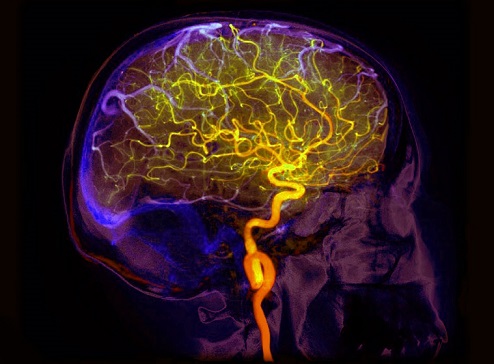COVID-19 Causes Reversible Cerebral Vasoconstriction Syndrome That Lasts for Months
Nikhil Prasad Fact checked by:Thailand Medical News Team Jan 15, 2025 1 year, 4 weeks, 1 day, 10 hours, 13 minutes ago
Medical News: In the ongoing exploration of COVID-19’s far-reaching impacts on human health, researchers have uncovered a significant connection between the virus and reversible cerebral vasoconstriction syndrome (RCVS), a condition marked by temporary constriction of blood vessels in the brain. While RCVS is not a new medical phenomenon, its association with COVID-19 infection has only recently come to light. This link was established through a systematic review led by experts from Ewha Womans University College of Medicine in Seoul, South Korea.
 COVID-19 Causes Reversible Cerebral Vasoconstriction Syndrome That Lasts for Months
COVID-19 Causes Reversible Cerebral Vasoconstriction Syndrome That Lasts for Months
RCVS is characterized by sudden and severe headaches, often referred to as “thunderclap headaches,” along with a range of neurological complications such as strokes and seizures. Fortunately, the condition is typically reversible within a few months. This
Medical News report delves into the findings of the study, which investigated 24 cases of COVID-19-related RCVS, shedding light on the condition’s clinical features, diagnosis, and implications for recovery.
Study Methodology
To better understand the relationship between COVID-19 and Reversible Cerebral Vasoconstriction Syndrome, the research team conducted an extensive review of case reports and case series. Their search spanned publications from November 2019 to August 2024, using databases such as PubMed, SCOPUS, and Web of Science. The search criteria included human studies and articles written in English that explicitly mentioned both COVID-19 and RCVS. Cases associated solely with COVID-19 vaccination or lacking sufficient evidence of RCVS were excluded.
A total of 24 cases were analyzed, combining 19 cases from previously published studies and five cases directly from the researchers’ institution. The study meticulously documented demographic data, medical history, COVID-19-related symptoms, RCVS-specific manifestations, diagnostic imaging findings, treatments, and outcomes.
Key Findings
Patient Demographics and Risk Factors
The average age of patients with COVID-19-related RCVS was 37.1 years, with a notable predominance of females (70.8%). Risk factors included a history of headaches or migraines, hypertension, and the use of vasoactive medications. Intriguingly, five of the 24 patients had received COVID-19 vaccinations, although vaccination alone was not identified as a trigger.
Symptoms and Diagnosis
Reversible Cerebral Vasoconstriction Syndrome (RCVS) typically manifests with thunderclap headaches and neurological symptoms such as nausea, vomiting, confusion, and visual disturbances. In this cohort, thunderclap headaches were reported in 83.3% of cases, and strokes occurred in 50% of the patients. Radiologic imaging played a crucial role in diagnosis, revealing vasoconstriction in major cerebral arteries, with the middle cerebral artery being the most frequently affected (90.9%).
COVID-19-related symptoms often
preceded RCVS, with fever, cough, and dyspnea being the most common indicators. Notably, six patients required intensive care for severe COVID-19 complications. Diagnosis of COVID-19 was confirmed in 95.8% of cases, primarily through polymerase chain reaction (PCR) testing.
Imaging and Treatment
Advanced imaging techniques such as CT, MRI, and angiography confirmed the presence of cerebral vasoconstriction and associated complications like subarachnoid hemorrhage and cerebral infarctions. Treatments for Reversible Cerebral Vasoconstriction Syndrome (RCVS) varied but commonly included vasodilators like nimodipine and steroids to reduce inflammation. Surgical interventions, such as decompressive craniectomies, were performed in severe cases.
Follow-up imaging showed that vasoconstriction was fully resolved in 64.3% of cases, partially improved in 28.6%, and worsened in 7.1%. These findings highlight the variability in recovery trajectories and underline the importance of timely intervention.
Clinical Implications
The study’s findings underscore the potential for COVID-19 to trigger Reversible Cerebral Vasoconstriction Syndrome (RCVS) through mechanisms like inflammation and disruption of the blood-brain barrier. These complications add to the growing list of neurological effects associated with the virus. While the majority of cases showed positive outcomes with appropriate treatment, the study also revealed a mortality rate of 9.1%, emphasizing the seriousness of this condition.
This research serves as a crucial reminder for healthcare providers to consider Reversible Cerebral Vasoconstriction Syndrome (RCVS) in patients presenting with severe headaches and neurological symptoms, particularly if they have a recent history of COVID-19. Early recognition and intervention are vital to prevent long-term complications and improve patient outcomes.
Conclusions
COVID-19 continues to reveal its multifaceted impact on human health, extending beyond its primary respiratory symptoms to include a wide array of systemic and neurological complications. This study provides valuable insights into the clinical characteristics of COVID-19-related Reversible Cerebral Vasoconstriction Syndrome (RCVS), a condition that, while rare, poses significant risks if left untreated. The findings highlight the importance of comprehensive diagnostic evaluations, including advanced imaging techniques, to detect and monitor cerebral vasoconstriction.
Treatment strategies such as vasodilators and steroids have proven effective in most cases, but the variability in outcomes underscores the need for personalized care. The study also raises questions about the underlying mechanisms linking COVID-19 to RCVS, warranting further research to elucidate these pathways and develop targeted therapies.
Ultimately, this research contributes to the growing body of knowledge about COVID-19’s long-term effects, emphasizing the need for vigilance and multidisciplinary approaches in managing its complications.
The study findings were published in the peer-reviewed Journal of Clinical Medicine.
https://www.mdpi.com/2077-0383/14/2/487
For the latest COVID-19 News, keep on logging to Thailand
Medical News.
Read Also:
https://www.thailandmedical.news/news/covid-19-increases-disruptions-in-neurovascular-coupling,-inducing-endothelial-dysfunction-among-mild-cognitive-cases
https://www.thailandmedical.news/news/malaysian-researchers-unveil-the-role-of-dppiv-in-covid-19-cerebrovascular-complications-and-post-covid-fatigue
https://www.thailandmedical.news/news/one-third-of-all-exposed-to-covid-19-likely-to-develop-cerebral-microbleeds
https://www.thailandmedical.news/articles/coronavirus
